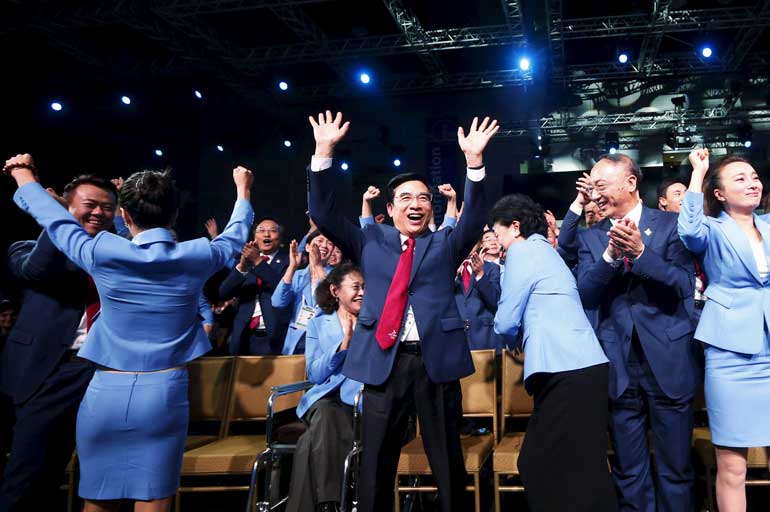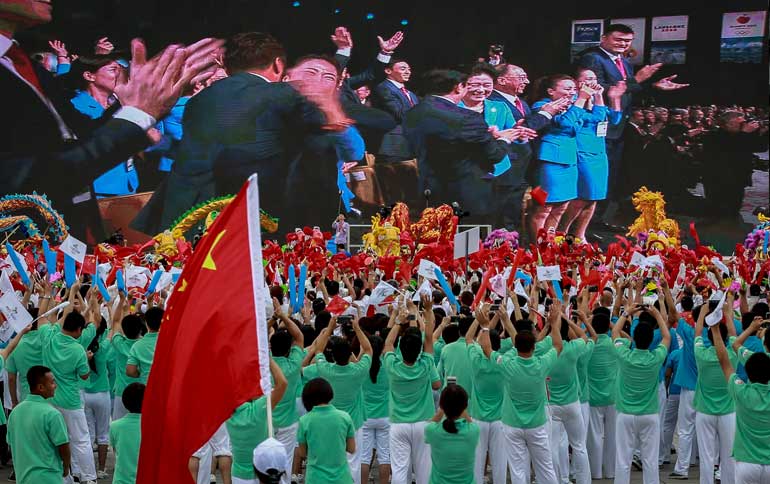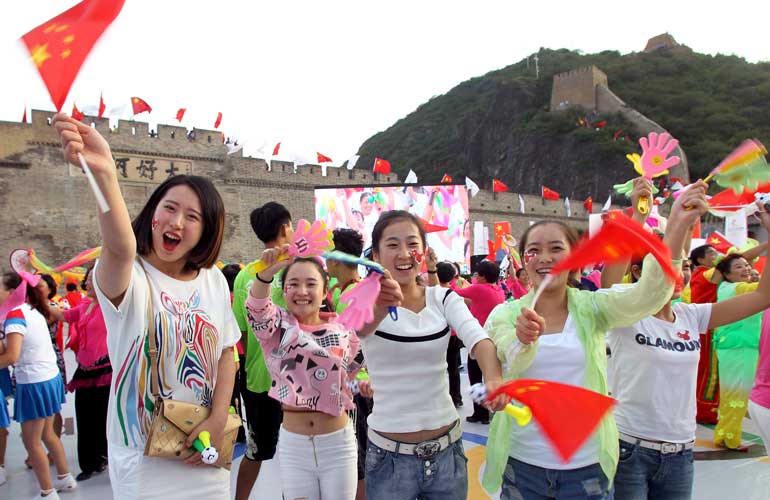Tuesday Feb 17, 2026
Tuesday Feb 17, 2026
Monday, 3 August 2015 00:00 - - {{hitsCtrl.values.hits}}

Beijing’s Mayor and President of the Beijing 2022 delegation Wang Anshun (C) celebrates after Beijing was awarded the 2022 Winter Olympic Games, defeating Almaty in the final round of voting, during the 128th IOC session in Kuala Lumpur, Malaysia - Reuters

People cheer as they watch on a screen the IOC announceing Beijing as the winner city for the 2022 Winter Olympics bid, outside the Birds’ Nest, also known as the National Stadium, in Beijing, China - Reuters

People wave Chinese national flags as they cheer after the IOC announced Beijing as the winner city for the 2022 winter Olympics bid, at the foot of the Great Wall, in Zhangjiakou, jointly bidding to host the 2022 Winter Olympic Games with capital Beijing, China - Reuters
Beijing was chosen by the International Olympic Committee (IOC) to host the 2022 Winter Olympics on Friday, becoming the first city to be awarded both the summer and winter Games.
The Chinese capital beat Kazakhstan’s Almaty in a secret ballot of 85 IOC members held at a convention centre in downtown Kuala Lumpur in a decision that drew immediate criticism from human rights activists.
The ballot was conducted twice, first electronically and then by paper after it was discovered the electronic system had malfunctioned.
The IOC said Beijing won a surprisingly close vote, 44-40, with one abstention.
“Just as with the Beijing 2008 Summer Games, the Olympic Family has put its faith in Beijing again to deliver the athlete-centred, sustainable and economical Games we have promised,” the Beijing Bid Committee said in a statement.
“This will be a memorable event at the foot of the Great Wall for the whole Olympic Family, the athletes and the spectators that will further enhance the tremendous potential to grow winter sports in our country, in Asia and around the world.”
Despite concerns about a lack of natural snow in the city’s distant mountains, and protests from human rights groups, Beijing had been the clear favourite to win the vote after it successfully hosted the 2008 Summer Olympics.
The high-powered Chinese delegation assured IOC members that Beijing was the safe choice because it had already proved it could stage the Games and said it would take winter sports into the backyard of the world’s most populated country.
The bid team from Almaty tugged at the IOC’s heartstrings, urging the committee, which includes sports administrators, captains of industry and even royalty, to resist the temptation to go back to China.
Instead, it called on the IOC to send a positive message to smaller developing countries that they too could host the world’s greatest sporting events.
Kazakhstan Prime Minister Karim Massimov delivered a powerful, moving speech, but the IOC, grappling with the effects of a global economic crisis and facing dwindling interest from countries wanting to host the Olympics, opted for Beijing. “I think both bids were viable but Beijing has won,” former IOC President Jaques Rogge told Reuters.
“It’s symbolic and it is a measure of confidence... it’s a good day for the Olympics.”
However, New York-based Human Rights Watch group, which was highly critical of both countries during the bid process, was unimpressed by the decision. “The Olympic motto of ‘higher, faster, and stronger’ is a perfect description of the Chinese government’s assault on civil society: more peaceful activists detained in record time, subject to far harsher treatment,” HRW’s China director Sophie Richardson said in a statement. “In choosing China to host another Games, the IOC has tripped on a major human rights hurdle.”
The IOC has been criticised by human rights groups for years, most notably after awarding the 2008 Summer Games to Beijing and the 2014 Winter Games to Russia’s Sochi.
It has since added anti-discrimination clauses to the host city contract.
IOC President Thomas Bach, who formally announced Beijing as the winner when he pulled the city’s name from an envelope, said the IOC was limited to what it could do outside of the sporting context.
“Outside the context of the Olympic Games the IOC has to respect the laws of sovereign states,” Bach said in his opening address to the Congress.
“The IOC is not a world government. Governments have their own responsibilities.”
The decision to go with China again reaffirmed the shifting power-base of world sport, with East Asia now poised to host three successive Olympics.
South Korea’s Pyeongchang will host the 2018 Winter Games and Tokyo the 2020 Summer Olympics.
But the choice, while expected, was more a reflection of the economic problems in the rest of the world rather than an overwhelming desire to stick with the same region. The four European candidates who originally entered the 2022 race all dropped out, citing concerns about the escalating costs of staging the Olympics, prompting the IOC to introduce a raft of reforms to cut costs and attract more bidders in the future.
Kazakhstan, a former Soviet state, pitched itself as a model for future hosts, embracing all the new reforms with a low-cost bid in a city which already has most of the facilities in place after hosting the 2011 Asian Winter Games.
Bidding to become the first majority Muslim country to stage the Olympics, the oil-rich Central Asian country also provided assurances that they had the money to pay for the Games.
“We’re feeling ok. We did our best,” said Andrey Kryukov, the vice chairman of Almaty’s bid team.
“Our bid is perfect.
“The decision has been done by the IOC... this is a competition, somebody wins, somebody loses.”